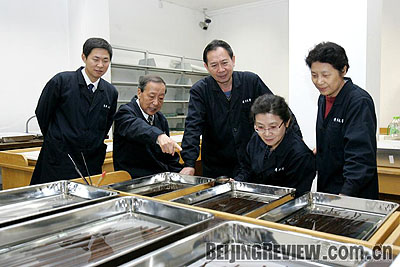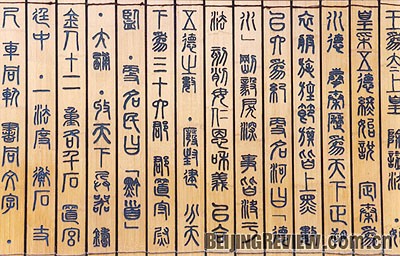|

VOLUMES OF KNOWLEDGE: Li Xueqin (second from left) and his team admire the significance of the rare bamboo strips (COURTESY OF TSINGHUA UNIVERSITY)
Have you ever wondered what books people read 2,000 years ago? A recent cultural relic donation in China has provided an answer to this question in a convincing way.
On October 22, China's prestigious Tsinghua University held a press conference in Beijing, announcing that the university had acquired a batch of bamboo strips that had been proved to date back to the Warring States Period (475-221 B.C.)
Tsinghua said that the batch of bamboo strips were donated in July by an alumnus named Zhao Weiguo, who got these treasures from an overseas auction. The university did not say when these bamboo strips were unearthed or who owned them previously.
The donation got academic circles in China spinning, as archaeologists and historians have found that the ancient items include a number of important ancient Chinese classics and historical documents, of which many have never been seen before.
To protect these treasures, Tsinghua set up a dedicated Center of Unearthed Documents Study and Preservation, inviting experts to do the primary protection and research work.
Li Xueqin, Director of the Center, Professor in the Department of History at Tsinghua and also a prestigious historian in China, said at the October press conference that the experts' studies show that these bamboo strips belong to the middle or late period of the Warring States Period, around 2,300 to 2,400 years ago, and were very likely unearthed in today's Hubei Province in central China.
High academic value
Bamboo strips were one of the main materials used by Chinese to write on before the invention of paper. In the past, the thin bamboo strips were connected by thread and became the pages of books read at the time.

According to Li, the bamboo strips found in China up to now basically include two kinds--books or documents and archives, and the latter occupied the majority of the findings. But what is significant about the bamboo slips donated to Tsinghua is that they are mostly books or documents, of which many are ancient classics that have great importance in studying the history and traditional culture of China.
"They are of high academic value, as they are very important to the archaeology and the research of ancient Chinese characters," Li said at the press conference.
Besides more than 2,100 pieces of bamboo strips, the relic of a wooden, colorfully-painted box that was proved to be used to contain bamboo-strip books was donated at the same time. Li said the box carried the strong design style of the State of Chu, a state of the Warring States Period located in today's Hubei Province.
The sizes of these ancient books are not the same. Li said that some strips were 46 cm long and some were less than 10 cm. "Such short bamboo strips have never been found before," said Li. He also told reporters that the characters written on them are very neat and still clear enough to see.
A few bamboo strips of the Warring States Period were found in the early 1950s. In the 1990s, two bigger finds were made of 800 and 1,000 bamboo strips respectively. The donation to Tsinghua are therefore the largest quantity and the oldest find so far, Li said.
Surprising discoveries
Li said one of the most important contents that experts found is the ancient classic Shangshu, or Book of History, a collection of ancient historical documents said to be mainly compiled by Confucius (551-479 B.C.), one of the greatest philosophers in ancient China and the founder of Confucianism.
| 